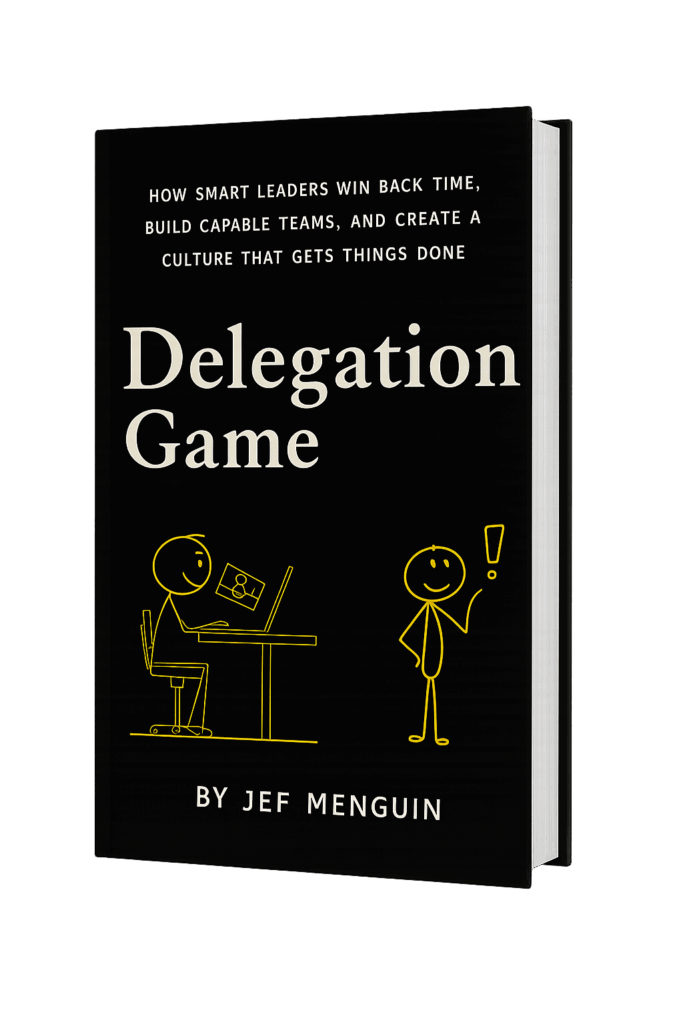You’ve probably said it before: “I thought I delegated that.”
But the result that came back wasn’t what you expected. The deadline was missed. The deliverable fell short. You ended up redoing the work yourself. Frustration builds—for you and for your team.
The problem isn’t laziness. It isn’t even lack of skill. It’s the handoff.
Too many managers delegate like tossing a ball across a busy street, hoping someone will catch it. Real delegation requires a clear, deliberate handoff—a system that prevents guesswork and reduces mistakes.
That’s where the 7-Step Delegation Play comes in.
In The Delegation Game I wrote:
“Delegation fails not in the doing, but in the handoff. A weak handoff creates confusion. A strong handoff creates ownership.”
The Danger of Skipping Steps
Mark, a regional manager, once asked his assistant to prepare slides for an important client meeting. He said, “Just pull together the data and make it look good.”
No clear definition of “done.”
No guidance on boundaries.
No authority to request missing numbers.
The assistant tried her best, but the slides were incomplete, off-brand, and late. Mark was furious. She was demoralized. The client was unimpressed.
What happened? Mark skipped the handoff steps. He assumed. She guessed. The task failed.
Skipping steps in delegation is like skipping pre-flight checks before takeoff—you may get lucky once or twice, but eventually, something crashes.
A Game You Can Play Each Day
Imagine instead that Mark had used the Delegation Play. He would have:
- Defined “done” in one sentence.
- Checked his assistant’s readiness against the risk.
- Set boundaries (use company templates, avoid unverified data).
- Given her access to the database and authority to request missing info.
- Agreed on a check-in point.
Same task, different process. The result? Slides on time, aligned, and stress-free.
That’s the power of a checklist—a repeatable play you can run every time.
The 7-Step Delegation Play
Here’s the play, your pre-flight checklist for any task handoff. Don’t treat this as theory. Treat it as the game plan.
Step 1: Define the Result
Say, in one sentence, what “done” looks like. This is the most important step. A clear “done” statement is like GPS—it gives direction without dictating the exact path.
Example: “This report is done when it compares last quarter’s numbers to this quarter’s in one page with three recommendations.”
Step 2: Place the Task on the Matrix
Not all tasks should be delegated the same way. Some are high-risk. Some people are high-readiness. The Delegation Matrix helps you match the right style:
- High risk + low readiness → Direct and Demo.
- High risk + high readiness → Co-pilot.
- Low risk + low readiness → Assign with Autonomy.
- Low risk + high readiness → Owner with Boundaries.
This step avoids the fatal mistake of “one-size-fits-all” delegation.
Step 3: Set Boundaries
Define the rules of the game. What’s off-limits? What must be avoided? When should they stop and check with you?
Boundaries protect the shape of the task without boxing in creativity.
Step 4: Give Authority and Resources
Delegation without resources is just delay. Make sure they have the tools, budget, access, and the authority to act without roadblocks. Let others know: “This person speaks with my authority on this project.”
Step 5: Agree on Check-Ins
Oversight is not micromanagement—it’s alignment. Decide how often you’ll check in (daily, weekly, milestone-based), in what format (stand-up, email, dashboard), and what signals (green/amber/red) mean.
Step 6: Document It
Write it down. A simple one-pager or message capturing what was agreed prevents forgetfulness and assumption. Call it your “Delegation Contract.”
Step 7: Debrief and Upgrade
After the task is done, talk through the facts, feelings, fixes, and future. What worked? What didn’t? What’s next? This is where real growth happens—for them and for you.
Why This Works
This checklist prevents 80% of delegation failures. Why? Because most problems stem from unclear expectations, mismatched readiness, or missing authority.
Each step addresses a failure point:
- Clarity (Step 1) prevents confusion.
- Fit (Step 2) prevents overload.
- Boundaries (Step 3) prevent surprises.
- Resources (Step 4) prevent bottlenecks.
- Check-ins (Step 5) prevent drift.
- Documentation (Step 6) prevents forgetfulness.
- Debriefing (Step 7) prevents recycling mistakes.
What’s at Stake if You Don’t
If you continue skipping steps, you’ll keep living in the frustration cycle:
- Delegated work comes back wrong.
- You redo it yourself.
- You stop delegating altogether.
That’s how managers burn out and teams stagnate. The cost isn’t just lost time—it’s lost growth.
Play the Delegation Game Well
Start treating delegation like flying a plane. No pilot says, “I’ve flown hundreds of times, let’s skip the checks.”
You shouldn’t either. Use the play. Run the checklist. Make delegation a repeatable success.
As The Delegation Game says:
“Delegation is not luck. It’s a play you can run. Follow the play, and your team will fly.”
Your Move
This week, try the 7-Step Delegation Play with one real task. Don’t overthink it. Pick something small but important.
- Write the “done” statement in one sentence.
- Map the task on the matrix.
- Set two boundaries.
- Give authority/resources.
- Agree on one check-in.
- Document the agreement in one paragraph.
- Debrief when finished.
Run the play. Notice how different it feels. Notice how differently they respond.
Where We Go Next
This is just the big picture. In the next few articles, we’ll unpack each step in detail:
- 1: Define the Result – The “Done” Statement.
- 2: Place the Task on the Matrix – Risk vs. Readiness.
- 3: Set Boundaries – The Rules of the Game.
Think of this as your Delegation Flight School. Each lesson takes you closer to clear handoffs and stronger teams.
You don’t need luck to delegate. You just need the play.
👉 I guide leaders to move beyond plans into practice. My book, The Delegation Game, and my consulting work help managers align strategy, people, and culture.
